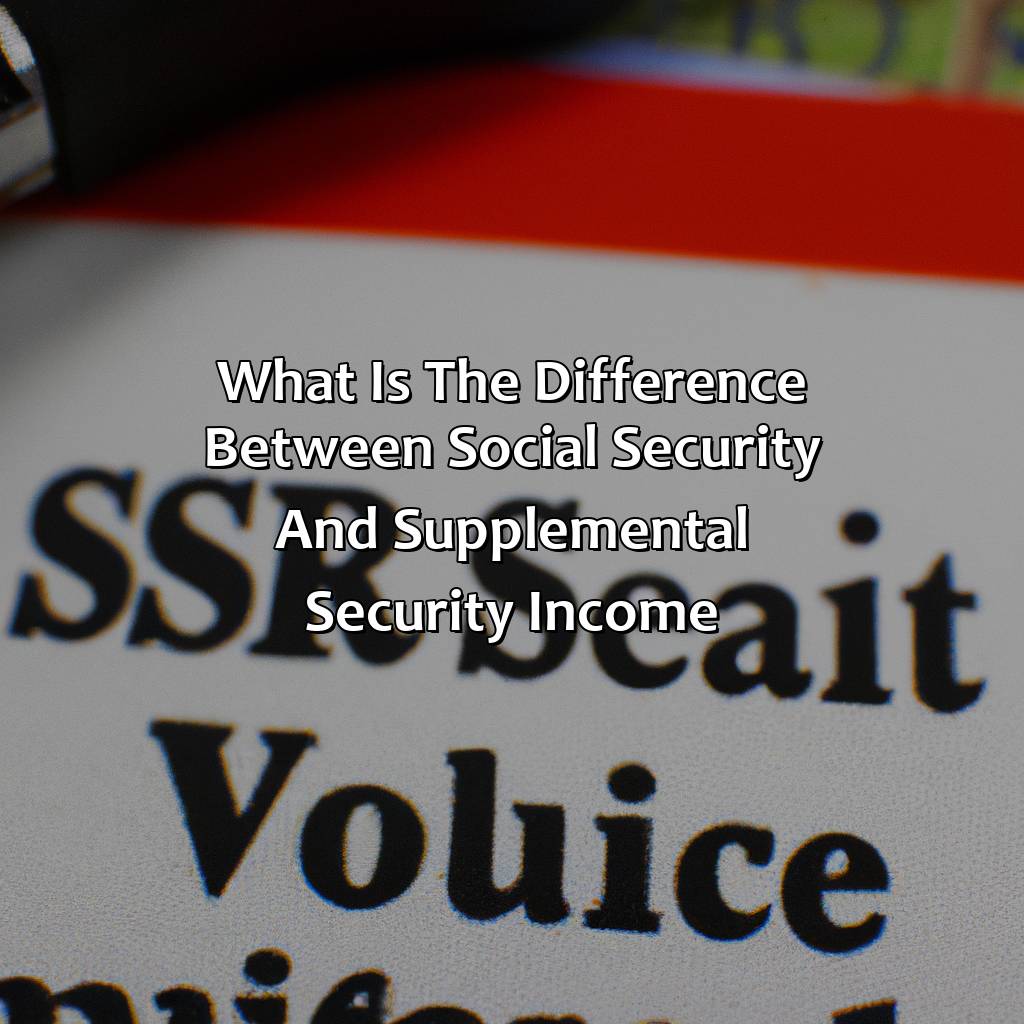What Is The Difference Between Social Security And Supplemental Security Income?
Key Takeaway:
- Social Security is a program primarily funded by payroll taxes that provides retirement, disability, and survivor benefits to eligible individuals who have paid into the system for a certain number of years.
- Supplemental Security Income (SSI) is a needs-based program that provides benefits to eligible disabled, blind, or elderly individuals with limited income and resources, regardless of their work history.
- While both programs aim to provide financial support to those in need, the main difference between Social Security and SSI is eligibility. Social Security benefits are based on an individual’s work history and contributions to the program, while SSI benefits are based on financial need.
Do you ever wonder what the difference is when it comes to Social Security and Supplemental Security Income? This article will explain the differences and how it affects your retirement. With this knowledge, you will be able to make informed decisions and maximize your retirement income.
Social Security
Gain insight into Social Security! To aid you, we’ve made a section about Social Security with subsections such as:
- Eligibility
- Benefits
- Types of Benefits
Research more to comprehend it better.

Image credits: retiregenz.com by Joel Jones
Eligibility for Social Security
To be eligible for benefits under Social Security, certain criteria must be met. These include:
- Having enough credits earned through working and paying Social Security taxes,
- Being at least 62 years old (or 60 for widows or widowers),
- Meeting disability or survivorship requirements.
Additionally, individuals who have not worked or paid taxes may still qualify for benefits through the Supplemental Security Income program based on their financial need. It’s important to understand the specific eligibility requirements for each program to ensure appropriate benefits are received throughout retirement. Remember to consult a trusted Social Security representative or online resources for more information and guidance on your unique situation.
Social Security benefits: helping retirees relax with a steady income, while simultaneously causing panic for those worried they’ll never be able to retire.
Benefits of Social Security
Social Security is a primary government program that provides financial assistance and care to people who have retired, disabled, or whose family member has passed. This program aims to provide benefits that can help individuals maintain their standard of living during tough times. Here are the five benefits of Social Security:
- Retirement Benefits – Provides regular income for retirees
- Disability Benefits – Provides income for those unable to work due to disability
- Survivor Benefits – Benefits provided to spouses, children, or parents of deceased workers
- Medicare Health Coverage – Provides health insurance coverage for individuals above 65 years old
- Social Security increases over time with inflation rates and encourages savings habits among individuals.
Apart from these benefits, Social Security also protects against inflation and guarantees monthly income at retirement. Many individuals may not know that Social Security is independent of other retirement plans like 401(k). Rather than as expected additional sources of income in your life after retirement, it provides baseline support. Interestingly enough, adding social security benefits into your long-term financial plans significantly impacts clients’ overall portfolio construction and distribution strategy as many turn towards ‘reverse mortgages’ via financial planners which generate monthly cash flows throughout their retirement period.
According to SSA reports, about 43 million retired workers receive an average benefit amount of $1,400 per retiree on average each month. Getting social security benefits is like winning the lottery- except you’re not rich and your reward is being able to afford groceries.
Types of Social Security benefits
Social Security benefits comprise a range of payments offered by the US government to eligible individuals. These benefits are not just limited to monthly retirement payouts but cover several other aspects of life.
- Retirement Benefits: Payments made towards retired workers aged sixty-two and above, including those who have become disabled before retirement age, can claim social security retirement benefits. Spouses and dependent family members may also receive part of these payments.
- Disability Benefits: Disabled workers or those with qualifying medical conditions can obtain social security disability income (SSDI) benefits. The amount paid is based on the recipient’s lifetime average earnings before becoming disabled.
- Survivor Benefits: Surviving spouses and children may qualify for survivor benefits if a contributing worker dies while still working or after collecting Social Security credits. The amount paid is based on the late worker’s total wages earned while alive.
- Medicare: Medicare is a federal health insurance program for people over 65 years old or with specific medical conditions. Social Security recipients are usually automatically enrolled in this plan when they become eligible for retirement payouts.
- Supplemental Security Income (SSI): This benefit serves as an additional safety net for low-income elderly, blind, or disabled people who are financially challenged and do not qualify for regular Social Security payments.
- Baby Boomer Benefit: People born between 1943 and 1954 will be affected by the Retirement Earnings Test if they apply for early retirement but continue to work part-time while collecting Social Security benefits. They must review their plan because it could trigger an unexpected reduction in benefit payments.
It should be noted that taking early payouts may lead to less accumulated money during one’s lifetime. Therefore it’s smart to develop a plan based on expected needs and expenses in old age, with guidance from professional financial advisors who specialize in this area.
Why settle for just social security when you can have the supplemental version? It’s like getting the deluxe package of financial support.
Supplemental Security Income
Let’s take a closer look at Social Security and its different types. Then, we can explore Supplemental Security Income and its features. We’ll go through its eligibility criteria and benefits in detail. That will help us understand Supplemental Security Income as a solution.

Image credits: retiregenz.com by Adam Washington
Eligibility for Supplemental Security Income
To qualify for Supplemental Security Income (SSI), individuals must prove they have limited income and resources, are at least 65 years old, blind or disabled. The Social Security Administration will determine if an applicant meets the criteria.
In addition to meeting the age or disability requirements and having limited income and resources, SSI eligibility requires that individuals be U.S. citizens or eligible non-citizens. Eligible non-citizens include lawful permanent residents, refugees, asylees and those with certain military status.
It’s important to note that SSI differs from Social Security Disability Insurance (SSDI). While SSDI is based on work history, SSI is funded by general tax revenues and covers those who have not worked or do not have enough work credits to qualify for SSDI.
To increase the chances of qualifying for SSI benefits, applicants should consider appealing any initial denials and providing thorough documentation of their medical conditions and financial situation. It’s also recommended that applicants seek legal assistance from an experienced attorney specializing in SSI cases.
SSDI might pay the bills, but SSI is like the cherry on top of the government assistance sundae.
Benefits of Supplemental Security Income
Supplemental Security Income provides assistance for low-income individuals with disabilities or age-related impairments. SSI helps with basic needs such as housing, food, and medical expenses. Here are some benefits of Supplemental Security Income:
- Provides financial support to individuals who do not qualify for Social Security Disability Insurance.
- Offers additional income for recipients of Social Security Disability Insurance with limited resources.
- Provides benefits based on current financial need rather than past work history.
- Offers continued support even if the recipient’s medical condition stabilizes or improves.
- Provides automatic eligibility for Medicaid in most states.
- Offers free job training and placement services through the Ticket to Work program.
It is important to note that SSI benefits vary by state due to differences in living expenses and other factors. Moreover, it is advised to check eligibility criteria before applying for SSI benefits.
PRO TIP: Individuals can apply for both SSI and SSDI, but the approval process can be long and complicated. It is advisable to seek assistance from a social security attorney or an advocate when filing a claim.
Why settle for just one type of government assistance when you can have both social security and supplemental security income? It’s like having your cake and eating it too. And then getting a second cake.
Difference between Social Security and Supplemental Security Income
Supplemental Security Income (SSI) and Social Security are two essential programs offering financial aid to the disabled, elderly and needy individuals. Here is a comprehensive comparison of SSI and Social Security.
| Characteristic | Supplemental Security Income (SSI) | Social Security (SS) | |
|---|---|---|---|
| Eligibility | Income, disability, age, citizenship or legal resident status | Age, survivors, or disability status | |
| Funding Source | Federal government general revenues fund program administered by the Social Security Administration. | Social security taxes paid by workers, employers and self-employed individuals. | |
| Type of Benefit | Cash assistance intended to cover basic needs such as food or shelter expenses | Cash benefit calculated based on the recipient’s lifetime average earnings before becoming disabled or retiring. | |
| Taxation of Benefits Received | Income affects the amount of benefit received. | Benefit taxed if income threshold is met. |
In addition to offering different benefits and eligibility requirements, SSI is a means-tested program dependent on the applicant’s economic need conditions, while Social Security Disability Insurance (SSDI) pays benefits based solely on past work experience. It is advisable to seek professional advice when determining which of these programs is best suited to one’s needs.
Pro Tip: While both services may seem similar in some respects, Supplemental Security Income provides financial support for people with lesser resources, who due to their age or disability struggle through no fault of their own.
Five Facts About the Difference Between Social Security and Supplemental Security Income:
Social Security is a federal program that provides retirement, disability, and survivors benefits to eligible individuals. (Source: Social Security Administration)
Supplemental Security Income (SSI) is a needs-based program that provides cash assistance to low-income individuals who are aged, blind, or disabled. (Source: Social Security Administration)
Social Security is funded through payroll taxes, while SSI is funded through general tax revenue. (Source: Social Security Administration)
Social Security has eligibility requirements based on work history and contributions to the program, while SSI has strict income and resource limits. (Source: Social Security Administration)
Social Security benefits are generally higher than SSI benefits, and eligibility for both programs can affect each other. (Source: Social Security Administration)
FAQs about What Is The Difference Between Social Security And Supplemental Security Income?
What is the difference between Social Security and Supplemental Security Income?
Social Security and Supplemental Security Income (SSI) are two separate programs under the Social Security Administration. While they both provide assistance to those in need, they have different eligibility requirements, benefits, and funding sources.
Who is eligible for Social Security?
Anyone who has paid into the Social Security system through payroll taxes for a certain period of time is eligible for Social Security benefits. This includes retired workers, disabled workers, and their families.
Who is eligible for SSI?
SSI is a needs-based program, which means it is intended for those with limited income and resources. Eligibility is based on factors such as age, disability status, and financial need.
What types of benefits does Social Security provide?
Social Security provides retirement, disability, and survivor benefits to qualified individuals and their families. These benefits are based on the worker’s earnings history and can be paid out to the worker or their dependents.
What types of benefits does SSI provide?
SSI provides cash assistance to individuals and couples who meet the program’s income and resource requirements. The benefits can be used to cover basic needs such as food, housing, and medical care.
Is there a difference in funding between Social Security and SSI?
Yes, there is a difference in funding sources between these programs. Social Security benefits are paid out of the Social Security Trust Fund, which is funded by payroll taxes. SSI benefits, on the other hand, are financed by general tax revenues.
 Checkout this IRS Loophole
Checkout this IRS Loophole 
